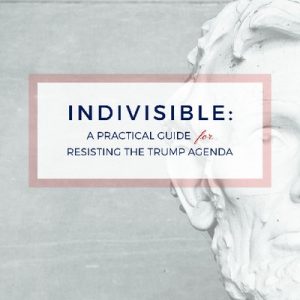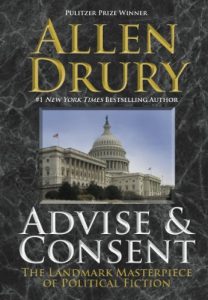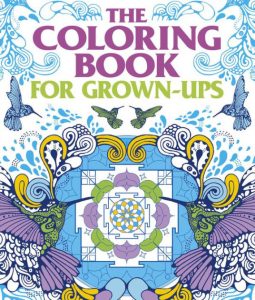January 5, 2017
‘You shall no longer take things at second or third hand,
nor look through the eyes of the dead, nor feed on
the specters in books;
You shall not look through my eyes either, nor take
things from me;
You shall listen to all sides, and filter them from yourself.
-Walt Whitman
Indivisible Guide
‘The dogmas of the quiet past are inadequate to the stormy present. The occasion is piled high with difficulty, and we must rise with the occasion. As our case is new, so we must think anew and act anew. We must disenthrall ourselves.
-Abraham Lincoln
Former congressional staffers reveal best practices for making Congress listen.
Seth Godin
The Candy Diet
If we don’t care to learn more, we won’t spend time or resources on knowledge.
“The bestselling novel of 1961 was Allen Drury’s Advise and Consent. Millions of people read this 690-page political novel.
In 2016, the big sellers were coloring books.
Fifteen years ago, cable channels like TLC (the “L” stood for Learning), Bravo and the History Channel (the “History” stood for History) promised to add texture and information to the blighted TV landscape. Now these networks run shows about marrying people based on how well they kiss.
And of course, newspapers won Pulitzer prizes for telling us things we didn’t want to hear. We’ve responded by not buying newspapers any more.
The decline of thoughtful media has been discussed for a century. This is not new. What is new: A fundamental shift not just in the profit-seeking gatekeepers, but in the culture as a whole.
“Everything should be made as simple as possible, but no simpler.”*
[*Ironically, this isn’t what Einstein actually said. It was this, “It can scarcely be denied that the supreme goal of all theory is to make the irreducible basic elements as simple and as few as possible without having to surrender the adequate representation of a single datum of experience.” Alas, I’ve been seduced into believing that the shorter one now works better.]
Is it possible we’ve made things simpler than they ought to be, and established non-curiosity as the new standard?
We are certainly guilty of being active participants in a media landscape that breaks Einstein’s simplicity law every day. And having gotten away with it so far, we’re now considering removing the law from our memory.
The economics seem to be that the only way to make a living is to reach a lot of people and the only way to reach a lot of people is to race to the bottom, seek out quick clicks, make it easy to swallow, reinforce existing beliefs, keep it short, make it sort of fun, or prurient, or urgent, and most of all, dumb it down.
And that’s the true danger of anti-intellectualism. While it’s foolish to choose to be stupid, it’s cultural suicide to decide that insights, theories and truth don’t actually matter. If we don’t care to learn more, we won’t spend time or resources on knowledge.
We can survive if we eat candy for an entire day, but if we put the greenmarkets out of business along the way, all that’s left is candy.
Give your kid a tablet, a game, and some chicken fingers for dinner. It’s easier than talking to him.
Read the short articles, the ones with pictures, it’s simpler than digging deep.
Clickbait works for a reason. Because people click on it.
The thing about clickbait, though, is that it exists to catch prey, not to inform them. It’s bait, after all.
The good news: We don’t need many people to demand more from the media before the media responds. The Beverly Hillbillies were a popular show, but that didn’t stop Star Trek from having a shot at improving the culture.
The media has always bounced between pandering to make a buck and upping the intellectual ante of what they present. Now that this balance has been ceded to an algorithm, we’re on the edge of a breakneck race to the bottom, with no brakes and no break in sight.
Vote with your clicks, with your sponsorship, with your bookstore dollars. Vote with your conversations, with your letters to the editor, by changing the channel…
Even if only a few people use precise words, employ thoughtful reasoning and ask difficult questions, it still forces those around them to catch up. It’s easy to imagine a slippery slope down, but there’s also the cultural ratchet, a positive function in which people race to learn more and understand more so they can keep up with those around them.
Turn the ratchet. We can lead our way back to curiosity, inquiry and discovery if we (just a few for now) measure the right things and refuse the easy option in favor of insisting on better.”
Fact from Fiction
Higher Ed takes on Fake News Epidemic
Universities are working to tackle a digital age issue that’s making it more difficult to discern fact from fiction
Political transparency advocacy group VoteSmart has cataloged and published speeches, voting records, campaign financing and news coverage of more than 40,000 candidates for political office throughout the United States since 1992, and next month, will relocate to Drake University as its new national headquarters.
Officials say the relocation continues a tradition of partnership between VoteSmart and higher education, as the office has found permanent stations at schools like Oregon State University, the University of Arizona, the University of Southern California and the University of Texas at Austin. Throughout its history, they say, the organization has looked to higher ed as the lightning rod for change in political structure, social awareness, and today what some call a new threat to democracy: fake news.
The rise of fake news has become a wide topic of corporate and consumer culture over the last six months, peaking with the 2016 election and intense scrutiny of traditional and social media outlets and the impact of false stories which helped to drive false narratives about political candidates and events.
Facebook, the world’s largest social media platform, this week announced steps to limit the sharing and publishing of fake news on its site, which estimates suggest reaches 170 million North Americans daily. VoteSmart officials say colleges and universities are central to challenging news organizations and social platforms to stem the effects of fake news, which is part of the historic role of social change and information awareness that has spurred student movements for generations.
At the University of Maryland, journalism faculty remains in regular conversation about teaching quality industry practices, while giving students the full scope of their responsibility to provide accuracy and timeliness.
“We’re teaching students that they are going to have a tougher time with readers just assuming that they are credible,” says Lucy A. Dalglish, dean of UMD’s Philip Merrill College of Journalism. “Now more than ever before. you have less leeway to make mistakes.”
She says that the university has developed media literacy training for faculty and students with a specific portion of the course dedicated to discerning good and bad news sources. While Internet technology has made the job tougher for debunking bad news sources, she says the journalists can still do more to help the public understand why information is important, and how it is cultivated for reporting.
“We also need to teach them to stick up for themselves and for the industry they are going into. It’s also important to do a better job of explaining where we got information. Mention open records, public meeting acts so people know that the reporting is based upon something.”
The journalism school is also developing a pilot program for incoming students to learn better Internet search skills, and currently offers a mandatory skills source for freshmen and sophomores in conjunction with the school’s library to receive research insight from credentialed librarians.
“Younger people almost always take the more idealistic side of life, and have an enthusiasm for truth and accuracy,” says VoteSmart founding board member and senior consultant Adelaide Kimball. “They aren’t afraid to call out a lack of facts, and campuses have always been the appropriate places to do that.”
Kimball says that thousands of college students have helped to drive the VoteSmart agenda for decades, with its commitment to fact gathering and provision driving crossover appeal among students from a variety of college majors and career ambitions to volunteer as fact checkers and researchers. She says that any effort colleges and their students can make to reverse the effects of accepted misinformation preserves the integrity of journalism industry, and democracy at large.
“It’s becoming hard to convince people that they need the facts, that they need the truth,” says Kimball. “Somehow, we’ve got to get people to care, and to recognize what may not be accurate or fake and that they don’t accept it anyway.”
But what happens when caring turns to controversy on campus? From the 2015 Black on Campus Movement to this year’s student clashes on topics like academic freedom, free speech and white nationalism, some institutions are at odds on how to navigate areas of protest, information spreading and promotion, and social connotations carried by all areas of student mobilization.
Jennifer Glover Konfrst is an assistant professor and co-leader of Drake’s Strategic Political Communication program, and says that even in the classroom, curriculum and attitudes have shifted to analyze the effects of fake news on a public growing in its comfort with misinformation.
“In the past, we might have talked about the risks of being incorrect or sloppy in reporting, but you didn’t see it happening very often,” Konfrst says. “Now, we have the opportunity to show them this is what’s so harmful about fake news; it’s been shared 90,000 times and it’s not true, and it takes 13 hours for a story to be debunked on average online, and it’s all over the world.”
Faculty have been at the center of a specific news movement of their own in recent weeks, with the national college conservative advocacy organization Turning Point USA publishing a ‘Professor Watchlist,’designed to highlight professors whom it says are advancing liberal political agendas through teaching and in academic spaces. “TPUSA will continue to fight for free speech and the right for professors to say whatever they wish ; however students, parents, and alumni deserve to know the specific incidents and names of professors that advance a radical agenda in lecture halls,” according to a statement from its website.
The American Association of University Professors responded recently with a petition encouraging faculty members to submit their names to Turning Point USA for inclusion on the lists, suggesting that the tactics would not breed fear among the academic enterprise.
“The American Association of University Professors has supported academic freedom and opposed those who seek to curtail it for more than a hundred years, and will continue to do so, because the common good depends upon the free search for truth and its free exposition,” read a statement from the petition. “The type of monitoring of professors in which you are engaged can only inhibit the process through which higher learning occurs and knowledge is advanced.”
Konfrst, who was aware of the watchlist, says that she discloses her political affiliation at the beginning of her courses, and at their conclusion asks in her student evaluations of they felt all voices were afforded a chance to be heard.
“It’s hard, because you don’t want to have to feel like you have to prove your legitimacy to your students. I tell them that I’m going to allow all voices to be heard, I’m not going to tell you my political beliefs because it’s not about that. I put it out there that I have opinions, but I don’t think you’re going to notice them. Putting it out there is helpful, because there’s a difference in being unopinionated and being fair in your writing.”
Kimball says that collegiate response to fake news creation, ultimately, will prove to be a historic task for the sustainability of the public trust.
“We do see the advent of fake news as an enormous problem for democracy and our civic culture, she says. “I’m happy to hear that colleges are taking up this challenge immediately, because this is one of the most dangerous developments in our civic culture and probably hundreds of years, if not ever.”
“We seem to have gotten to a place, partly because of technology and people’s nature, that people have a hard time distinguishing what’s accurate and what’s not. If schools across the country can pound that into students and cover those important issues in a way that helps people to easily see what is accurate and what is not, it is a huge public service.”





